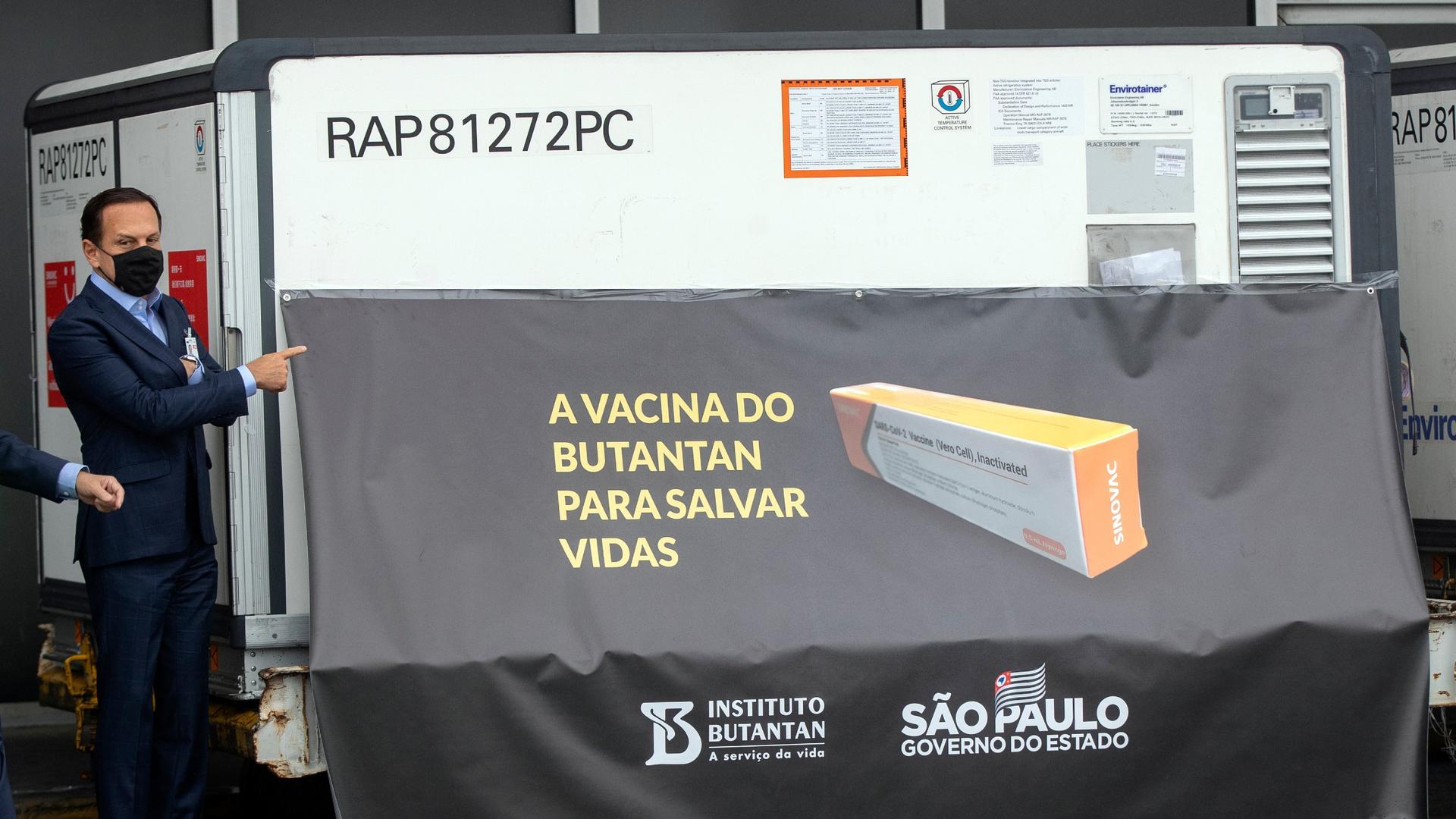Vaccine wars: Brazil needs China’s COVID-19 shot, but Bolsonaro prefers Oxford jab
As the number of COVID-19 fatalities keeps climbing, debate over the safety and effectiveness of coronavirus vaccines for use in Brazil is turning into a partisan tug of war.
CoronaVac, a vaccine developed by China’s Sinovac Biotech, has shown promising results. But scientists like Natalia Pasternak, a research fellow at the University of São Paulo’s Institute of Biomedical Sciences says Brazil’s President Jair Bolsonaro is attempting to block use of the vaccine simply because it was developed in China.
Brazil’s federal government has a deal to get up to 100 million doses of the Oxford-AstraZeneca vaccine candidate if it works. Other developers, such as Pfizer, are reportedly offering deals to Bolsonaro’s administration. São Paulo state, the epicenter of the crisis in Brazil, has an agreement to buy a vaccine made by Sinovac, which is in the final phase of testing.
More than 171,000 people have died of COVID-19 in Brazil, second only to the United States. Bolsonaro, who has long resisted the advice of most scientists and health experts to restrict social and economic activity, says he won’t take any working COVID-19 vaccine himself and calls the use of masks to limit the spread of the disease “the last taboo to fall.”
Pasternak spoke with The World’s Marco Werman about how CoronaVac has become a political football in Brazil.
Marco Werman: Tell us about this vaccine, CoronaVac. Do you expect Brazilians to be lining up to get it soon?
Natalia Pasternak: The vaccine is produced in China and imported from China to Brazil, at least the first million doses. And then it’s going to be produced locally. The president, Jair Bolsonaro, has been politicizing the vaccine, saying that he doesn’t want the Chinese vaccine, that it’s no good and that he’d much rather have the English vaccine, the one for which he made an agreement with AstraZeneca — the Oxford vaccine. It became a political dispute here in Brazil.
It’s nothing about science. It’s about politics. So we have on one side the president, Jair Bolsonaro, saying that this vaccine is no good. And on the other hand, we have the governor of São Paolo, João Doria, stating that this is a good vaccine and should be taken into consideration with the national immunization plan. And he’s right, although, of course, he’s been political about it. But there’s no technical excuse to exclude CoronaVac from the National Program for Immunization. So we’re facing a hard time here in Brazil with this politicization of science.
So everything about this vaccine has been politicized in Brazil. How exactly did that happen?
President Bolsonaro wants — of course — his vaccine, and he’s immature enough to think that there is such a thing in the world. So he chose the Oxford vaccine for a bilateral agreement between the federal government and the ministry of health. And he doesn’t want interference from the state of São Paolo, which is the largest state in Brazil. And the governor of São Paulo is probably a candidate for the next presidential elections.
Bolsonaro, like Trump, has demonized China during this time. Is Bolsonaro’s skepticism about the vaccine simply because of where it comes from?
President Jair Bolsonaro has been saying from the start that the virus has been fabricated in China and now they want to produce their own medications and vaccines to counter it and that it’s just a minor flu and there is no need for a vaccine. He says that he’s not going to get a vaccine. He doesn’t think it’s necessary. And he said this should not be mandatory in Brazil.
So, Natalia, how have scientists like you countered the disinformation and tried to keep politics from interfering into the investigation of how this vaccine works?
It’s been a real challenge. When misinformation and fake news come directly from the federal government and from the Ministry of Health, it’s quite impossible to fight back. But we’ve had help. I think the Brazilian press has been really helpful in bringing voice to scientists and giving us space in traditional media — in TV shows and newspapers — so that we can really explain to the population what the science is about and how vaccines are safe and effective.
Will Brazilians have access to any of the other vaccines under development? Or is CoronaVac really your only option?
We have a bilateral agreement with AstraZeneca for the Oxford vaccine. And we also entered the COVAX agreement from the World Health Organization, which should give us access to their vaccine portfolio. But we chose the smallest coverage available. So we chose to buy vaccine doses sufficient to vaccinate 10 percent of our population. Now, the federal government is starting to discuss an agreement with Pfizer to see if we can get some millions of doses shipped to Brazil and if we can accommodate them. Pfizer, of course, has a challenge with the very low temperature at which it has to be stored and transported. So hopefully we’ll have an agreement with them, too. But the federal government should seek other agreements with other pharmaceutical companies because we have a population of over 200 million people. So it’s not going to be easy and it’s not going to be done with one vaccine alone.
This interview has been lightly edited and condensed for clarity. Associated Press contributed to this story.
